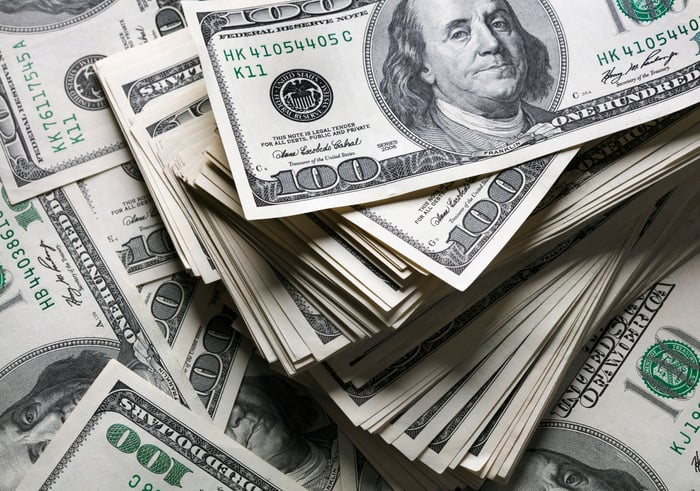The broader market has been unstoppable ever since a first-quarter stock market crash for the ages in 2020. The benchmark S&P 500 has jumped 75% since the bear market bottom of March 23, 2020, while the tech-heavy Nasdaq Composite is up an eye-popping 104%.
These bounce-back rallies are historic in scale -- yet they pale in comparison to the gains registered by a handful of momentum stocks that have recently captivated retail investors. If investors had the foresight to invest $250,000 in the following five stocks one month ago, they'd be sitting on at least $1 million, if not more, as of Feb. 10.

Image source: Getty Images.
Sundial Growers: $1.08 million
You could argue that Canadian licensed marijuana stock Sundial Growers (SNDL 1.60%) is the most popular stock among retail and momentum traders at the moment. It's extremely liquid (over 2.5 billion shares traded hands on Feb. 10) and can be purchased for less than $3 a share. Share price should have no bearing on your investment thesis, but momentum traders love a low-priced stock.
Sundial's incredible rally, which would have turned a $250,000 investment into $1.08 million in a month's time, is tied to a combination of the Reddit-fueled rally and ongoing speculation that the U.S. will legalize marijuana at the federal level. This comes after comments from Senate Majority Leader Chuck Schumer that he'd like to see federal cannabis reform enacted.
However, Sundial Growers has become one of the worst serial diluters in the entire cannabis space over the past four months. Since the end of September, the company's outstanding share count has skyrocketed from a little over 500 million to 1.56 billion. What investors are left with is a company creeping up on a $4.5 billion market cap that's losing money and is only expected to generate a meager $63 million in full-year sales.
In other words, Sundial investors are likely playing with fire, and they'll eventually get burned.

Image source: Getty Images.
Cassava Sciences: $1.48 million
Clinical-stage biotech stock Cassava Sciences (SAVA) actually tops the pack. A $250,000 investment one month ago would be worth nearly $1.5 million as of Feb. 10. This is after a more than 50% retracement from its Feb. 4 intraday high.
Cassava Sciences' shares caught fire after a Feb. 2 press release outlined the interim analysis of an open-label, early stage study involving simufilam as a treatment for Alzheimer's disease. Cassava notes that the National Institutes of Health-funded study showed a 10% mean improvement from baseline to month 6 in cognition scores, as well as improved dementia-related behavior.
Also, Cassava Sciences doesn't have a large number of outstanding shares, which made it a popular target of the Reddit-fueled rally.
Keep in mind, though, that this is a very early stage interim analysis. Alzheimer's disease has proven especially difficult to treat, with the vast majority of late-stage clinical trials falling flat. Not to take the wind out of Cassava's sails, but the odds are very much stacked against its success.

Image source: Getty Images.
Naked Brands: $1.11 million
Another big gainer that will have investors scratching their heads in disbelief is intimate apparel and swimwear designer, wholesaler, and retailer Naked Brands Group (NAKD). Hovering around $0.34 a share just a month ago, Naked Brands is now above $1.50 a share. That means it's turned a $250,000 investment into about $1.11 million in mere weeks.
The fuel behind this monumental rally is twofold. First, Naked Brands announced a strategic shift on Jan. 21, which involves divesting its unprofitable brick-and-mortar operations and focusing exclusively on growing its e-commerce platform. Since companies that focus on e-commerce often have less overhead, the margins on retail products can be higher.
Secondly, Naked Brands has seen its short interest skyrocket, which made it the perfect target of the Reddit crowd on WallStreetBets (WSB). Retail investors on the WSB chatroom have bought shares or out-of-the-money calls in heavily short-sold companies like Naked Brands to effect a short squeeze.
Investors should be especially careful with Naked Brands. It's lost money every year between fiscal 2015 and fiscal 2020, and its sales have been declining since fiscal 2018.

Image source: Getty Images.
Koss: $1.3 million
Headphone, Bluetooth speaker, and communication headset manufacturer Koss (KOSS) has also been smoking-hot over the past month. A prescient investment here would have turned $250,000 into a cool $1.3 million.
The stock took off because (you guessed it) of the Reddit rally. However, unlike other stocks that had high levels of short interest, Koss was targeted for its relatively low number of shares in its tradable float (similar to Cassava). In a matter of days, Koss' shares rocketed from $3 to as high as $174 in premarket trading. In 40 years, this company's stock had never eclipsed $15.25 a share.
It's highly unlikely that Koss is going to be able to hang onto its gains over the long run. Even taking into account that it's retraced significantly from its all-time closing high, the company's second-quarter operating results simply don't support the recent bullishness surrounding this stock. Sales in the first six months of fiscal 2021 are up a modest 6% to $10.1 million, and the vast majority of its net income through six months ($635,819) was derived from a $506,700 Payment Protection Program loan that was forgiven and recognized as income.
Koss operates in a highly commoditized industry and isn't worth buying here.

Image source: Getty Images.
Tilray: $1.41 million
Have I mentioned that marijuana stocks are hot? If you thought Sundial's performance was incredible, Canadian pot stock Tilray (TLRY) has been even better. A $250,000 investment in Tilray would have appreciated to north of $1.4 million as of Feb. 10.
Like Sundial, Tilray is benefiting from hopes that federal cannabis reforms could be enacted in the U.S. as early as this year. No Canadian pot stocks are going to enter the U.S. market until the federal government reschedules weed or removes it entirely from the controlled substances list.
But Tilray has another catalyst driving it higher. In mid-December, it and Aphria (APHA) announced their intent to merge and create the largest global weed stock by annual sales. It's actually a reverse merger, with the Tilray name being kept and Aphria's shareholders receiving 0.8381 shares of Tilray stock for every Aphria share owned. This merger is a savior for Tilray, as the company had been facing potentially serious cash concerns.
While the combination of Aphria and Tilray should help the combined company lower production costs, improve margins, and more easily reach new markets, the recent run-up in Tilray's stock looks wholly unjustified. We've seen this bubble scenario play out before in Tilray, and it won't end well for momentum chasers.
This article represents the opinion of the writer, who may disagree with the "official" recommendation position of a Motley Fool premium advisory service. We're motley! Questioning an investing thesis -- even one of our own -- helps us all think critically about investing and make decisions that help us become smarter, happier, and richer.





